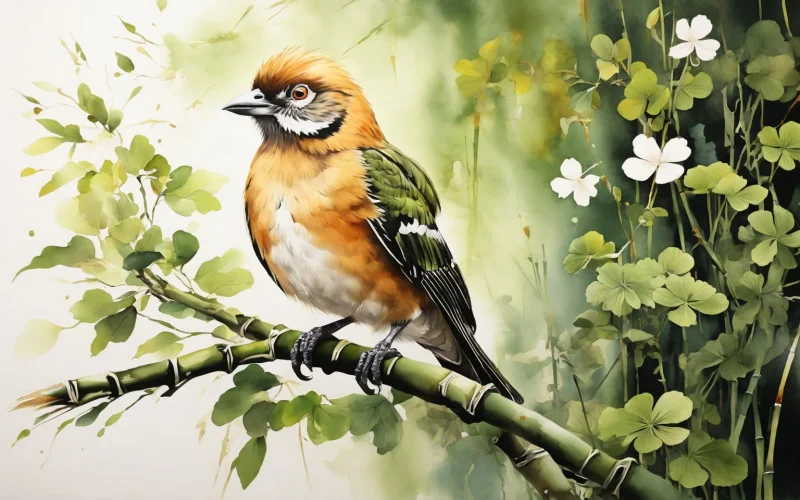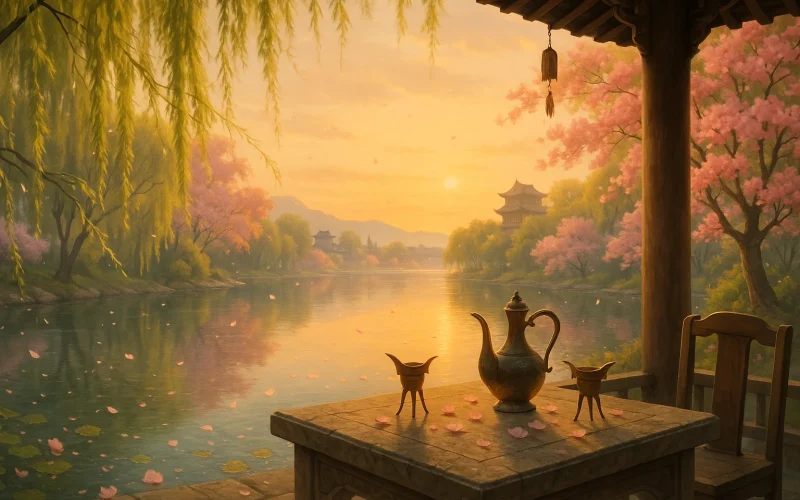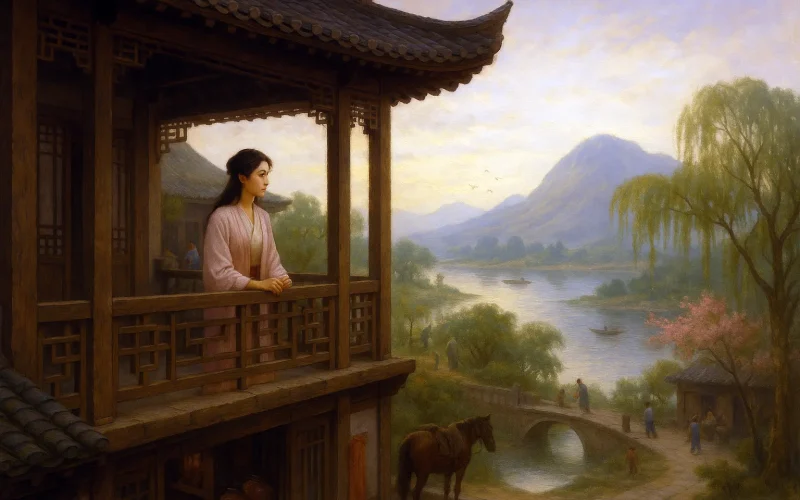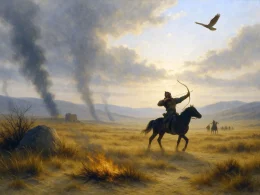A hundred trills, a thousand calls—shifting at will,
Through scarlet blooms and purple hills, from branch to bough.
Only now I understand:
What golden cages hold
Can never match
The song it sings unfettered in the woods.
Original Poem
「画眉鸟」
欧阳修
百啭千声随意移,山花红紫树高低。
始知锁向金笼听,不及林间自在啼。
Interpretation
Composed during Ouyang Xiu's exile to Chuzhou amid political factionalism, this poem uses the song of thrushes to articulate the scholar-official's stifled ambitions and yearning for unfettered freedom. A paradigm of "expressing ideals through objects" (托物言志), its avian imagery becomes a veiled manifesto against political confinement and a celebration of natural liberty.
First Couplet: "百啭千声随意移,山花红紫树高低。"
Bǎi zhuàn qiān shēng suí yì yí, shān huā hóng zǐ shù gāo dī.
A hundred trills, a thousand calls—wherever they please roaming,
Through scarlet-purple mountain blooms, trees high and low combing.
The opening paints kinetic freedom: verbs "shift" (移) and "roam" (随意) mirror the birds' unrestrained movement, while chromatic "scarlet-purple" (红紫) and vertical "high-low" (高低) create a vibrant ecological theater. This organic harmony contrasts sharply with the artificial constraints to follow.
Second Couplet: "始知锁向金笼听,不及林间自在啼。"
Shǐ zhī suǒ xiàng jīn lóng tīng, bù jí lín jiān zì zài tí.
Only now I understand: locked in gilded cages singing
Never matches woods where notes take wing, unbound, swinging.
The epiphanic "only now" (始知) introduces a political parable. The "gilded cage" (金笼), symbolizing prestigious yet restrictive officialdom, is acoustically and morally inferior to the unbridled forest songs. The comparison transcends ornithology to critique Song bureaucracy's spiritual suffocation.
Holistic Appreciation
The Thrush is a classic example of lyrical poetry that uses an object to convey deeper aspirations. Comprising just four lines, the poem masterfully blends scene and emotion, rich in meaning. The opening couplet paints a refreshing natural landscape, depicting the thrush’s unrestrained freedom—vibrant mountain flowers and towering trees frame its melodious song, evoking an idyllic and lively woodland scene. The following couplet shifts to the image of a "gilded cage," contrasting "confinement" with the "forest’s liberty," using the thrush’s plight as a metaphor for the struggles of life and the regrets of an unfulfilled scholar, expressing the poet’s yearning for unfettered existence.
Here, the "gilded cage" is more than a mere birdcage—it symbolizes the suppression of talent within the rigid bureaucracy. Moved by the bird’s song, the poet reflects on his own circumstances, subtly weaving together a love for freedom, disillusionment with officialdom, and a longing for reclusive harmony. The result is a profoundly artistic expression of emotion.
Artistic Merits
- Symbolism Through Object, Meaning Beyond Words: The entire poem uses the thrush’s song and predicament to convey the aspirations of those thwarted in their ambitions.
- Stark Contrasts, Profound Allegory: The juxtaposition of "forest" and "gilded cage" heightens the tension between liberty and constraint, sharpening the poem’s central theme.
- Concise Language, Condensed Emotion: In just twenty-eight characters across four lines, the poem distills natural beauty, lyrical description, and deep allegory into a unified whole.
- Harmony of Scene and Sentiment, Flowing Naturally: The visual beauty and inner emotion reflect each other, offering both aesthetic pleasure and intellectual resonance.
Insights
This poem teaches us that true happiness and dignity lie not in material wealth or external constraints, but in inner freedom and spiritual ease. Even within a "gilded cage," nothing compares to the unrestrained joy of a single song in the wild. Ouyang Xiu uses the thrush as a mirror for human experience, its voice reflecting the heart’s longing—reminding us that while we must acknowledge life’s limitations, we should cherish the independence and liberty of the inner self. As the poem declares: "No match for the forest’s carefree cry"—a free voice surpasses even the most splendid of cages.
About the Poet
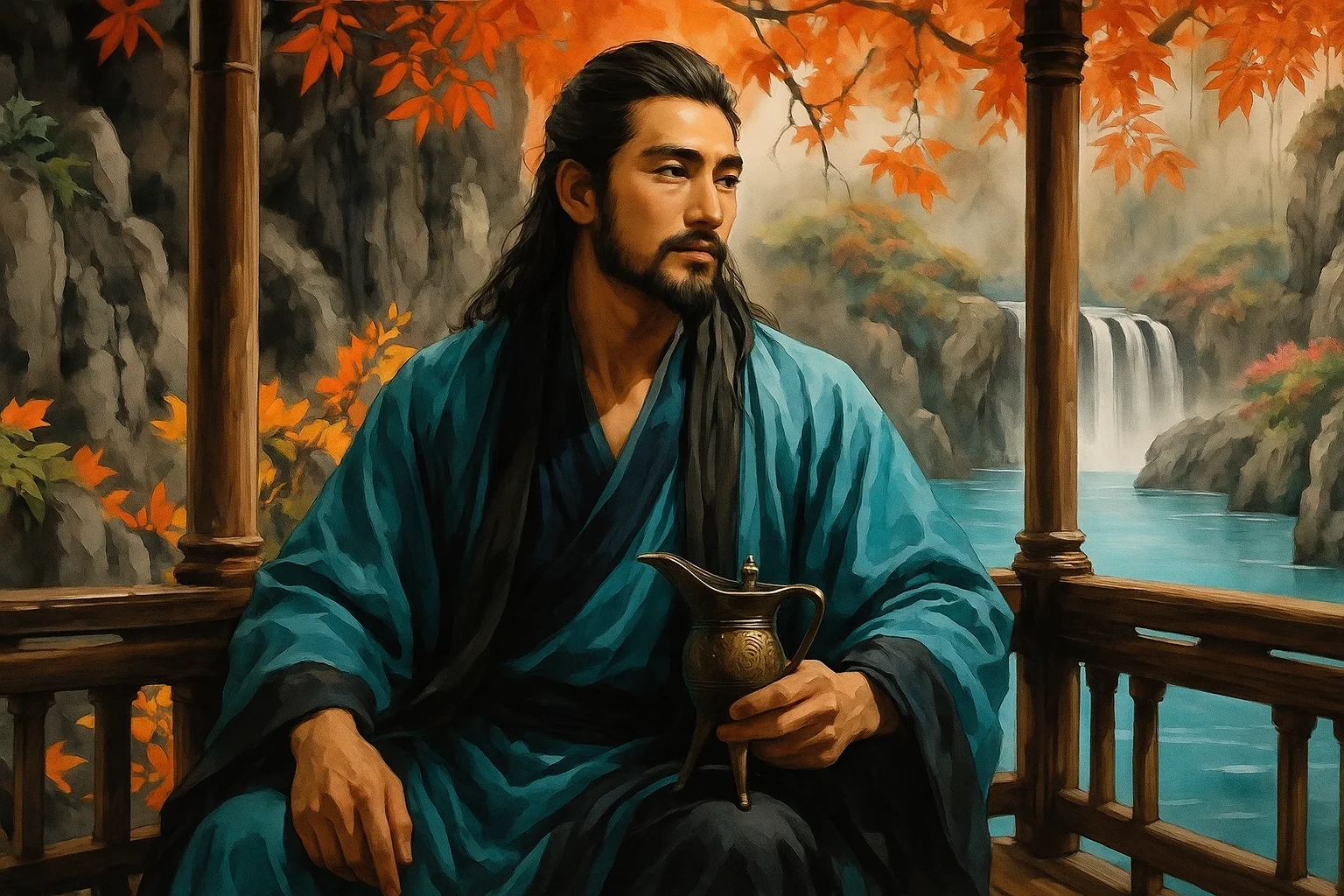
Ouyang Xiu (欧阳修, 1007 - 1072), a native of Yongfeng, Jizhou (present-day Jiangxi Province), emerged as the preeminent literary figure of the Northern Song Dynasty. After attaining the jinshi degree in 1030, he spearheaded a literary reform movement that rejected the ornate Xikun style prevalent at court. As a mentor who nurtured literary giants like Su Shi and Zeng Gong, he laid the foundation for the golden age of Northern Song literature. Recognized as one of the "Eight Great Prose Masters of Tang and Song," Ouyang stands as the pivotal figure in the transformation of Northern Song literary culture.






